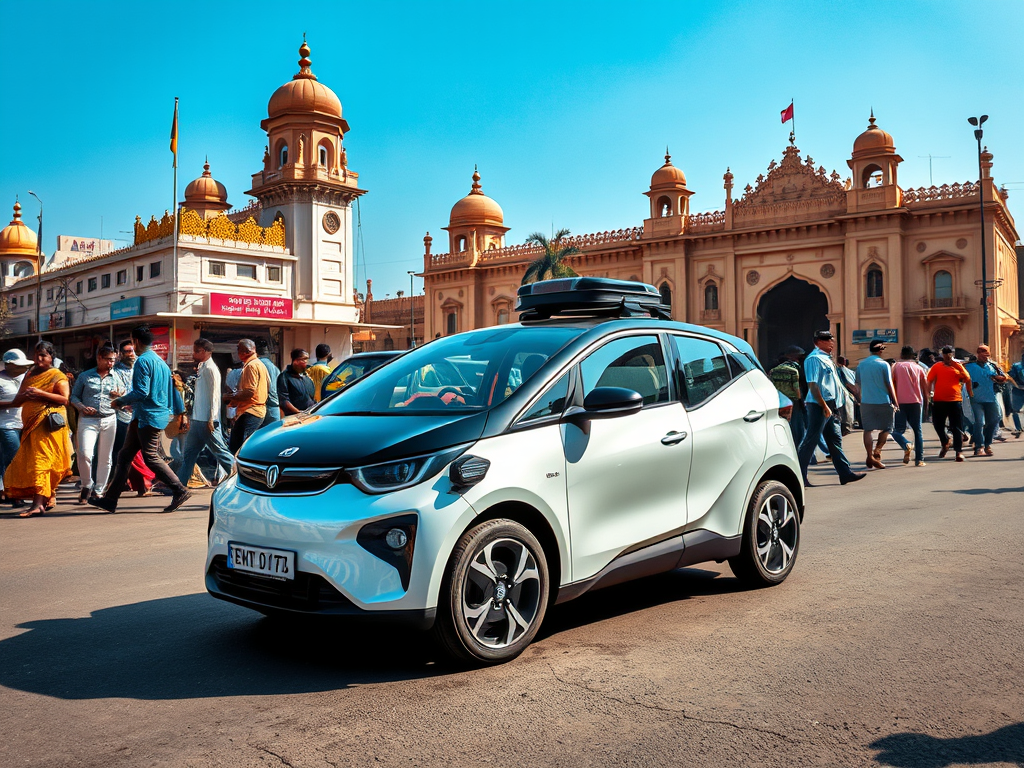The craze for electric vehicles (EVs) in India is growing by the day. Rising fuel prices, environmental concerns and government subsidies have made EVs a practical and eco-friendly option. Many new models have been launched in 2025, which offer the perfect combo of style, performance and affordability.
In this blog, we will look at India’s Top Electric Cars in 2025, their comparison based on price, range, features, and user reviews so that you can choose the best EV for yourself.

Tata Nexon EV Facelift
Tata Nexon EV facelift comes in 2025 with a new look and improved battery. Its sporty design and powerful performance make it a popular family electric SUV. The company claims that this car gives a range of 465 km on a full charge, which is perfect for urban commute and occasional highway drives. It gets features like multiple drive modes, connected car tech, and ADAS. The price also starts at ₹ 14.49 lakh, which makes it an attractive option for mid-range EV buyers. Tata’s strong service network is also a plus point.
MG ZS EV
The MG ZS EV 2025 model is a premium electric SUV for those who don’t want to compromise on features and comfort. The car offers a range of up to 461 km and comes with a 50.3 kWh battery pack. Modern features like panoramic sunroof, digital cluster, AI voice assistant are included in it. MG’s after-sales support is also quite strong, especially in metros. Its price starts at ₹ 18.98 lakh, which places it in the slightly premium segment. But for those looking for a feature-rich EV, this is an excellent choice.
Mahindra XUV400 EV
Mahindra XUV400 EV is a solid competitor against the Tata Nexon. This car offers a combo of aggressive pricing and powerful performance. Claimed range is 456 km and battery capacity is 39.4 kWh. 0–100 km/h acceleration is completed in just 8.3 seconds, making it ideal for performance lovers. Mahindra has given a spacious cabin and decent boot space in the XUV400, but the interior might feel a bit outdated. Price starts at ₹ 15.49 lakh, making it a value-for-money EV.
Tata Punch EV
The Tata Punch EV is perfect for buyers who want a compact size and budget-friendly EV. It has a bold design and is based on Tata’s new Acti.ev platform. The claimed range is 421 km and it comes with a 35 kWh battery. Prices for the Punch EV start at ₹ 10.99 lakh, making it the most affordable SUV-style EV in the segment. It gets a digital instrument cluster, 10.25-inch touchscreen, and multiple regen modes. It is a practical and reliable option for daily city commute.
Hyundai Kona Electric
The 2025 version of the Hyundai Kona Electric has been launched with a new look and updated features. The car is targeted at premium buyers who want a classy design along with performance. With a 39.2 kWh battery, this EV offers an approx 484 km range. Its smooth driving experience, refined cabin, and advanced safety features make it a luxury electric SUV. But with a starting price of ₹ 23.75 lakh, it does not fit in everyone’s budget. The car is ideal for urban professionals and tech-savvy buyers.
Comparison Table
| Car Model | Price Range (₹ Lakh) | Claimed Range (km) | Battery Capacity | Fast Charging Time | Notable Features |
|---|---|---|---|---|---|
| Tata Nexon EV | 14.49 – 19.99 | 465 | 40.5 kWh | ~56 minutes (0–80%) | ADAS, 6 Airbags, 12.3″ Infotainment |
| MG ZS EV | 18.98 – 25.00 | 461 | 50.3 kWh | ~60 minutes | Panoramic Sunroof, ADAS, i-Smart tech |
| Mahindra XUV400 EV | 15.49 – 18.99 | 456 | 39.4 kWh | ~50 minutes | Fast Acceleration, Dual Tone Colors |
| Tata Punch EV | 10.99 – 15.49 | 421 | 35 kWh | ~56 minutes | Compact SUV, 10.25″ Touchscreen |
| Hyundai Kona Electric | 23.75 – 25.00 | 484 | 39.2 kWh | ~57 minutes | Premium Interiors, Bluelink, Paddle Regen |
Government Support & Subsidies
The Indian government has given many incentives to promote electric vehicles. Subsidies are being given under the FAME-II scheme and many state governments are waiving registration charges and road tax. Extra benefits are available in states like Delhi, Maharashtra, Tamil Nadu. Charging stations are also being rapidly installed across major highways and cities. All these factors are making EVs even more affordable and practical for 2025 buyers.
Which EV is best?
If you are looking for a budget friendly city car, the Tata Punch EV is the best choice. If you want a mix of performance and affordability, consider the Mahindra XUV400. The Nexon EV and the MG ZS EV are both strong options in the mid segment with good features and range. If you want premium range with maximum comfort, the Hyundai Kona Electric is perfect for you. Ultimately, choose the best EV as per your need, budget and daily usage pattern because the electric future is here!
Benefits of EV – A Smart & Sustainable Choice
Buying electric vehicles is not just a modern trend but a smart and sustainable decision. The biggest benefit is saving of fuel cost the running cost of EVs is much lesser than traditional petrol/diesel vehicles. You only have to pay electricity charges, which comes down to ₹1-2 per km. The second major benefit is environmental impact EVs have zero tailpipe emission, which reduces pollution and helps in fighting climate change. Maintenance of EVs is also less as they do not have engine oil, clutch, or complex gear system. Along with this, the Indian Government is also providing subsidies, tax benefits, and charging infrastructure support to EV buyers. Due to all these factors, EVs have now become not only eco-friendly but also an economically smarter choice.
What things should be kept in mind while buying EV car?
There are some important things to keep in mind before buying an EV so that your decision is smart and future-ready.
1. Range – First of all, check whether the claimed range of the car is sufficient for your daily or weekly usage. If you travel a lot, prefer high range EV.
2. Charging Infrastructure – It is also important to check whether charging stations are available near your home or on the office route.
3. Battery Warranty and Life – Battery is the most expensive component of an EV, so keep in mind its warranty (usually 8 years) and performance guarantee.
4. Maintenance and Service Network – Also consider whether the company’s service support is strong or not.
5. Features & Safety – Features like ADAS, airbags, regenerative braking are essential for your safety and comfort. And last but not least, take advantage of government subsidies and state-wise incentives as well these can reduce your overall cost considerably.
There are some other top EV cars which you can check out through this video
Discover more from The trendy info
Subscribe to get the latest posts sent to your email.









